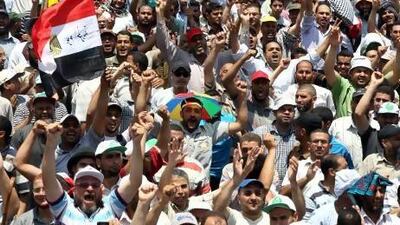CAIRO // Tensions flared in Egypt yesterday, the eve of mass demonstrations planned against the president Mohammed Morsi, as duelling protest groups clashed in major cities and the death toll rose to at least eight.
The US president Barack Obama, in South Africa, said he was "looking at the situation with concern" and called on the Egyptian factions to engage in dialogue to prevent more bloodshed.
An American student, Andrew Pochter, was killed during clashes in Alexandria on Friday while attempting to photograph protests near the Muslim Brotherhood's headquarters. Two others died in the same area and five have died in similar clashes in cities since Wednesday.
Groups opposing Mr Morsi have called for huge demonstrations today, the one-year anniversary of his term in office, in a bid to force him out. They have called on Egyptians to turn out in the streets by the millions. Several thousand protesters were already camped in Tahrir Square yesterday in anticipation of today's events.
Meanwhile, Mr Morsi's supporters from the Muslim Brotherhood and other Islamist groups were holding "indefinite" demonstrations to protest against what they called attempts to unseat a democratically elected president by members of the old regime of Hosni Mubarak and others.
One of the opposition groups that has helped coalesce today's demonstrations, Tamarod, or Rebel, said yesterday it had collected 22 million signatures on a petition calling for Mr Morsi to resign. That figure could not be verified, but it gave a sense of the anger that has spread across the country in recent months.
Mr Morsi's critics accuse him of allowing his Islamist allies to dominate politics and of infringing on the powers of the judiciary, while stifling dissent through autocratic measures. But what could make today's protests bigger than previous political demonstrations is the deteriorating economy.
Petrol shortages have left motorists standing in queues for hours, power outages have become chronic and unemployment and food prices are rising.
The problems are all the more stark because Mr Morsi ran on a campaign of creating an Egyptian "renaissance" last year, promising that he would increase investments into the country and push for higher wages.
Observers have been closely monitoring the statements of the army, which said last week that it would not allow the country to descend into greater violence. Additional troops were sent to Cairo and other cities to protect vital government buildings.
Al Azhar, Egypt's highest Islamic authority, warned on Friday of the risk of "civil war" if political parties refused to compromise.
Those warnings have gone unheeded by both sides. At a Tamarod press conference yesterday, activists said Mr Morsi's presidency was "illegitimate" and criticised the United States for its support of the government.
The Brotherhood has hit back with vitriol. On the group's website on Friday, it accused anti-Morsi groups of showing "a deliberate intention to turn current demonstrations into fertile breeding ground for thugs and corrupt figures of the defunct regime, taking advantage of the opposition youth's enthusiasm in order to drag the country into a spiral of violence, vandalism and instability".
* With Reuters and Associated Press

